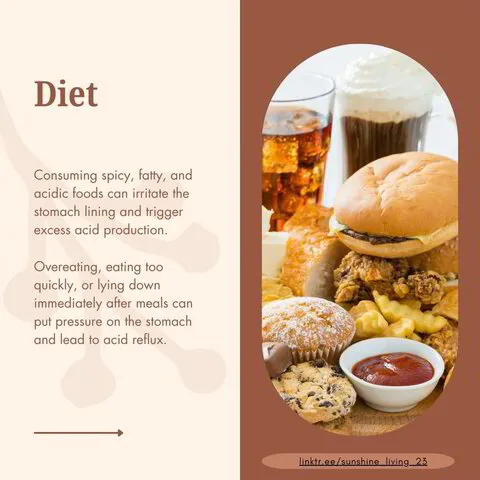In the intricate dance of digestion, gastric acidity takes center stage. The level of acidity in your stomach plays a crucial role in breaking down food and maintaining gut health. In this comprehensive guide, we explore the world of gastric acidity, from its significance and symptoms to causes, solutions, and the transformative benefits of balanced gut acidity.
Understanding Gastric Acidity:
- Gastric acidity refers to the level of hydrochloric acid in the stomach, which aids in breaking down food and activating digestive enzymes. This acid also acts as a protective barrier, preventing harmful bacteria from entering the digestive system.
Recognizing Gastric Acidity Symptoms -
An imbalance in gastric acidity can lead to several discomforting symptoms:
- Heartburn: A burning sensation in the chest or throat.
- Indigestion: Feeling overly full, bloated, or experiencing discomfort after eating.
- Acid Reflux: Stomach acid flowing back into the esophagus, causing a sour taste.
- Bloating and Gas: Excessive gas and abdominal discomfort.
- Nausea: Feeling queasy or having the urge to vomit.
Causes of Gastric Acidity Imbalance -
Several factors can disrupt the balance of gastric acidity:
- Diet: Spicy, fatty, and acidic foods can trigger excess acid production.
- Stress: Chronic stress can increase acid production.
- Lifestyle: Smoking, alcohol, and lack of physical activity can contribute.
- Medical Conditions: Conditions like GERD (gastroesophageal reflux disease) can cause acidity issues.
Solutions to Gastric Acidity Imbalance -
Restoring balance to gastric acidity requires a holistic approach:
- Dietary Adjustments: Opt for a balanced diet with lean proteins, whole grains, and fresh fruits and vegetables.
- Mindful Eating: Chew slowly, eat smaller meals, and avoid overeating.
- Stress Management: Engage in relaxation techniques like meditation and deep breathing.
- Hydration: Drink enough water to help dilute stomach acid.
- Sleep Hygiene: Prioritize quality sleep to allow the digestive system to function optimally.
Foods That Support Balanced Gastric Acidity -
Certain foods can help regulate stomach acidity:
- Bananas: Their natural antacid properties can soothe excess stomach acid.
- Oatmeal: A high-fiber food that helps absorb excess acid.
- Ginger: Known for its anti-inflammatory and digestive benefits.
- Leafy Greens: Rich in minerals that can help neutralize acid.
- Probiotic-Rich Foods: Yogurt, kefir, and sauerkraut promote gut health and digestion.
Benefits of Balanced Gastric Acidity:
- Efficient Digestion: Balanced acidity aids in breaking down food effectively.
- Reduced Discomfort: Fewer instances of heartburn, acid reflux, and indigestion.
- Improved Nutrient Absorption: Nutrients are better absorbed in a balanced environment.
- Gut Microbiome Health: Maintains a favorable environment for beneficial gut bacteria.
- Enhanced Overall Wellness: A balanced gut supports immune function and mental well-being.
Conclusion:
Nurturing balanced gastric acidity is an art that intertwines with your overall well-being. By embracing mindful eating, making dietary adjustments, and fostering a stress-free lifestyle, you can restore equilibrium to your gut's delicate ecosystem. Remember, a harmonious balance of gastric acidity isn't just about digestion; it's a key to unlocking vitality and vibrant health that radiates throughout your body and mind.
Resources:
Harvard Health Publishing. (2020). "The Science of the Gut-Brain Connection."
https://www.health.harvard.edu/diseases-and-conditions/the-gut-brain-connection
American College of Gastroenterology. (2021). "Understanding Gastroesophageal Reflux Disease (GERD)." https://www.niddk.nih.gov/health-information/digestive-diseases/acid-reflux-ger-gerd-adults/eating-diet-nutrition
National Institute of Diabetes and Digestive and Kidney Diseases. (2020). "Eating, Diet, & Nutrition for GER & GERD." https://www.niddk.nih.gov/health-information/digestive-diseases/acid-reflux-ger-gerd-adults/eating-diet-nutrition
Healthline. (2022). "The 12 Best Foods for an Upset Stomach."
Harvard T.H. Chan School of Public Health. (2020). "The Nutrition Source: Probiotics." https://www.hsph.harvard.edu/nutritionsource/microbiome/


